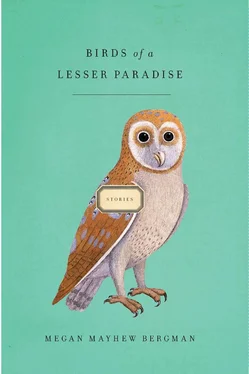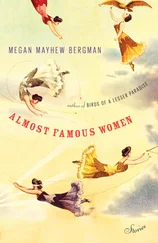I lay down next to him. I lifted his lip as I had seen the veterinarian do and pressed my finger into his gums. They were pale. His breathing was shallow.
Vito heard the bear first.
I’ve read stories of mothers who found strength from nowhere, lifting cars to free their children. Vito’s sprint was no less remarkable. He opened the screen door with his muzzle, sailed like lightning down the porch steps and into the night.
I could not stop him. I could not bring him back.
Russ would tell me later of his retinal detachment, the early tremors of Parkinson’s the doctor had found, the fact that he was done flying.
But that night he was a warm chest. He squeezed the back of my neck.
Be brave, he said.
The next morning Vito’s black and tan coat was covered with dew. His side was still. Unscratched and beautiful he lay, all of him spent.
We buried him out back, next to a rusted steel till and a swath of wild honeysuckle.
There was an unsigned check in my wallet. I had written it on the way to the vet, thought of passing it to him when Russ was not looking. An empty promise.
I knew there would be lips to suture, ribs to mend, mouths to feed, socks to buy.
I like to think of it — the way Vito ran that night. Fast. On point. Nose to the ground. Fearless.
There is no need to explain to our daughter the death of her first dog. Poppy, better than any of us, understands the urge to have what you must have. She can still wring what she wants from the world. It has listened to her cries and delivered. She still trusts the raw pull of desire. One day it will tear her away from us, take her down a dirt road to a place she does not recognize, and there she will make her home. Away from everything she understands, and close to everything she wants.
I’m grateful to the teachers I’ve had who have offered advice, edits, and inspiration. George Singleton, you were first, and reeled in a girl who was, initially, just as enthusiastic about the Furman cafeteria French fries as your writing workshop. I’m thankful for my instructors at Bennington, all of whom helped turn raw ideas into publishable work, particularly the dog-friendly and skillful trio of Amy Hempel, Bret Anthony Johnston, and Nick Montemarano.
These stories were further shaped by the generous editors and journals that published them. My sincere thanks to: Karen Seligman and Hannah Tinti at One Story, Carol Ann Fitzgerald and Marc Smirnoff at Oxford American, Tom Jenks and Mimi Kusch at Narrative, David H. Lynn and Tyler Meier at the Kenyon Review, Ian Stansel at Gulf Coast, James May at New South, Jim Clark at the Greensboro Review, Cara Blue Adams at the Southern Review , and R. T. Smith and Lynn Leech at Shenandoah . I’d like to thank Ladette Randolph at Ploughshares, and also guest editor Jim Shepard, who works magic.
My sincere appreciation to the editors who included my work in recent anthologies: Geraldine Brooks, Heidi Pitlor, and Houghton Mifflin Harcourt for The Best American Short Stories 2011; and Amy Hempel, Kathy Pories, and Algonquin for the 2010 edition of New Stories from the South .
Next, I’d like to thank the wonderful team at Scribner for taking me on, particularly Kara Watson and my editor, Samantha Martin. Sam, you are kind and brilliant. Thank you for making my work better and understanding my intentions.
I’m also deeply indebted to my agent, Julie Barer, of Barer Literary, who, despite her charming urban savvy, takes the time to understand and do right by my rural musings.
Rhombus, Dad, and Emily: You are good readers and patient believers. And even though I moved to New England, you’ll always have that Fort Macon video to remind me where I came from; don’t use it unless you have to.
To the Dogtor and Wumpus: Before you, I had nothing to write about. Dogtor, you enable, inspire, and help me write intelligently about urinary wall tumors and cows with mastitis. I am undeniably lucky with you in my life.
Wumpus, you are the most beautiful of muses. You cried and cracked the world wide open.
Introducing a new story by Megan Mayhew Bergman
Phoenix

I remember, most vividly, the tea my mother used to dye her auburn hair, the soup of crushed marigolds, rose hips, and paprika. It was crimson, like the blood that drips from Pete and Willow’s goats this morning, young wethers with slit throats strung up on a clothesline.
I’m busy enough to look away, forget their names. I walk head-down to the Big House. I have barn chores to do and if I keep doing them, I will get somewhere, which is better than the basement of my mother’s house. For years, I smoked cigarettes and self-educated, hiding behind a wall of art history books in her cabin, until I felt the urge to be out in the world, have my fingers in the dirt, do something real.
My father had always liked Turnbridge, Vermont, for its Revolutionary War history. He told me stories about British raids on frontier settlements: cattle killed, crops burned, sons marched off toward Canada, humbling winters. When I saw Pete’s ad— Wanted: Cheesemaker, organic farm in Turnbridge. No experience required —I called immediately. I thought I might feel closer to my father living someplace within the reaches of his imagination. I also saw a way into my adult life, pictured like-minded people with whom I could share milking duty, meals, and a tractor. Together we would make renowned cheese and build a farm we could be proud of: energy-efficient, fertile, pure.
Which is how I came to live and work at a homestead formerly known as Smart Ass Farm. Pete and Willow bought the property two years ago; the first thing they did was sell the donkeys and rename the place Green Dream Farm. The homestead consists of a two-story farmhouse from the 1800s with empty pastures out front, broken fencing, nascent vegetable plots, and a ramshackle barn with an uneven slate roof, outside of which crossbred goats climb stone fences and nibble fields of alfalfa. Pete’s on edge because the septic system needs replacing and the blueberry bushes have twig blight.
Willow! Pete yells, because he is always yelling at her. I’m not sure she hears him anymore, he yells so much. His anger has become background noise.
I’m filling up my water bottle at the kitchen sink when he walks in and grabs me by the elbow.
Phoenix, Pete says, do you know where Willow is?
His fingers are rough with dirt and I pretend to need something in the cabinet so I can shake them loose.
She’s doing the garlic, I say.
Pete’s the boss. Willow is just as much the boss as he is, theoretically, because they both own the farm, but some people are just natural bosses. Even though buying the farm was Willow’s idea, if Pete didn’t make decisions, nothing would happen. He’s an alpha male hiding in a Grateful Dead t-shirt.
I live in their guest room, so I know all about how much of a boss he can be: how to chop carrots, how to fold fitted sheets, the ways he prefers to make love. Not that they do much of that anymore; from what I can tell, Pete and Willow disgust each other. They moved to Vermont and bought a farm to “work on their relationship.”
Lesson learned: working a cold farm with a leaky old house and a flame-haired cheese maker living in your guest room will not fix your relationship. It will, I think, ruin it in record speed.
I expect one of them to leave any day. Pete came to the farm because he’s an apocalypse guy. An ex-banker from Boston, he hates the world, and is waiting for it to end. Willow came to the farm because she loves the world and wants to be closer to it. I am, philosophically, somewhere in between.
Читать дальше













